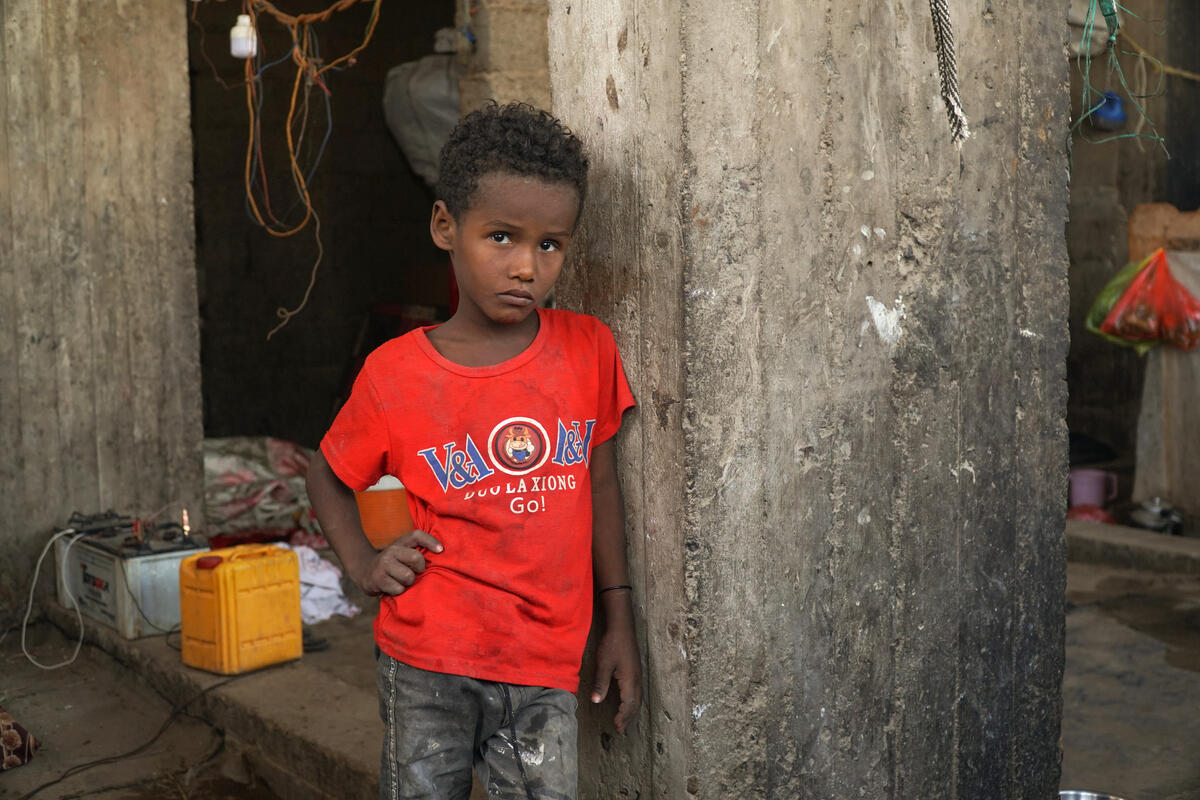Lack of funds threatening UNHCR's work in Libya, neighbouring countries
Lack of funds threatening UNHCR's work in Libya, neighbouring countries
UNHCR is facing a critical shortage of funds for our operations in Libya and neighbouring countries. Unless funds are swiftly committed by donor countries, this shortfall will likely impact vital humanitarian assistance for tens of thousands of people displaced by the recent fighting.
UNHCR has appealed for over US$68.5 million to cover the initial three to four months of the emergency. To date we have received USD$39.4 million, all of which has been spent or committed. We are calling on donor countries to urgently fund this shortfall.
Of the amount received, US$18.4 million has been contributed towards the joint UNHCR-IOM humanitarian evacuation of over 100,000 third country nationals from Egypt and Tunisia. Millions more have been spent on airlifting urgent aid supplies to Tunisia and Egypt, offering shelter and protection for tens of thousands of people awaiting evacuation, regularly trucking supplies into Libya and providing financial assistance to refugees and other vulnerable groups in Libya. Throughout Libya UNHCR has identified a need to expand activities to provide assistance to tens of thousands of displaced people and thousands of refugees who depend upon us for help.
UNHCR has a small team of national staff in Tripoli, who are doing their best to offer assistance to refugees and asylum-seekers registered with UNHCR. We consider the humanitarian needs in western Libya to be significant. UNHCR and partners are ready to offer humanitarian support in the west if and when permission is granted by the government.
We currently have emergency staff on mission in Tobruk and Benghazi in eastern Libya as part of an inter-agency team. Local authorities have identified over 35,000 displaced people, mostly from Ajdabiyya and others from Brega. They say that the actual number is likely to be around 100,000, since the population of Ajdabiyya is 120,000 and most people are thought to have left. While a few thousand have crossed into Egypt, the majority are displaced in Benghazi and Tobruk. According to the authorities, most of their basic needs are being addressed, thanks to the generosity of the local community. However, signs of strain are beginning to appear as a result of the deteriorating economic situation - compounded by the fact that state salaries have not been paid for two months. The local authorities say more and more displaced people are approaching them for assistance every day.
It is vital that our ongoing operations in Egypt and Tunisia are funded so that we can continue to support the governments of both countries to keep their borders open for all those fleeing the conflict.
In Tunisia UNHCR urgently needs funds to support the recent influx to Tunisia of Libyans fleeing the fighting in the Western Mountains. According to Tunisian authorities at Dehiba border, 1,620 Libyans crossed on Wednesday alone. Over 3,000 people have crossed in the past week into this area. Some 47 kilometres further west, in Remada, UNHCR has established a camp that now shelters about 350 people. Most of the Libyan families that have crossed into this area are staying with local families or at youth centres in Tataouine. One hotel is providing accommodation free of charge, while some Libyan bedouin have crossed with their cattle which are being cared for by local Tunisian families.
Meanwhile some 8,000 people are hosted in the camps near the Ras Ajdir border crossing with Libya. A third of this population is Somali and Eritrean refugees who cannot return home and are in need of alternative solutions.
In addition we need funds to support the local communities in and around Ras Adjir, Dehiba, Remada, Tataouine, as well as in other areas where local people are offering assistance to people fleeing the violence in Libya.
Meanwhile in Egypt, UNHCR staff are set to begin a needs assessment of Libyans living in Marsa Martrouh, a town some 200 km from the Egypt-Libya border. There are over 1,000 people stranded at the border including 567 refugees and asylum-seekers. According to the border authorities while Libyans continue to flee at a rate of more than 2,000 people a day, some 1,000 Libyans cross back into Libya from Egypt daily.
As of 13 April 513,129 have fled the violence in Libya. This includes 209,173 to Egypt (84,419 from Egypt, 63,747 from Libya and 61,007 others), 245,009 to Tunisia (20,617 from Tunisia, 57,221 from Libya and 167,171 others), 33,615 to Niger (31,066 from Niger and 2,549 others), 14,126 to Algeria (1,078 from Algeria, 3,599 from Libya and 9,449 others), 6,219 to Chad (6,113 from Chad and 106 others), 1,372 to Italy, 815 to Malta and 2,800 to Sudan.
For further information on this topic, please contact:
On the Egyptian border: Helene Caux on mobile: +201 294 66 378
On the Tunisian border: Firas Kayal on mobile +216 508 561 99
In Geneva: Adrian Edwards on mobile +41 79 557 91 20
Andrej Mahecic on mobile +41 79 200 7617
Sybella Wilkes on mobile +41 79 557 91 38









